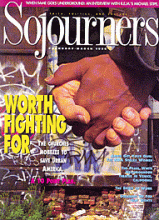More than 10 million black people now face a crisis of catastrophic proportions. Life in American inner cities is poor, brutish, and short; and future prospects are even bleaker.
Unlike many of our ancestors, who came out of slavery and entered this century with strong backs, discipline, a thirst for literacy, deep religious faith, and hope born of that faith, we have produced a generation that does not "know the ways of the Lord" - a "new jack" generation ill-equipped to secure gainful employment even as productive slaves. This generation provides unique insight into current economic opportunities.
Consider this achievement: A generation of poor black men, women, and children may reach the end of this century in a position worse than their ancestors who entered the century in the shadow of slavery. Unable to see a more rational future through the eyes of faith, they lack the hope that sustained their forebears. Lacking hope, they experience what sociologist Orlando Patterson has called "social death." But unlike the social death of slavery, this new social death is fundamentally spiritual. Rooted in the destruction of faith and hope, it produces a world in which history and identity are themselves divested of meaning, a world of nihilism and despair.
What, in these unprecedented circumstances, are the responsibilities of the churches - and black churches in particular? One observation is especially pertinent.
The pathologies of the cities are essentially an advanced expression of a more general crisis of moral and cultural authority that currently overshadows the lives of all black Americans born between 1950 and 1970. The black churches are not exempt from this crisis. Our blind pursuit of the false gods of the American Dream has come at the expense of institutional and political autonomy.
Read the Full Article

